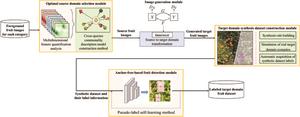In the dynamic area of agricultural AI, deep learning-based fruit detection is gaining attention, especially in smart orchards. However, these techniques rely heavily on large manually labeled datasets, and the process is time-consuming and labor-intensive. In our previous work, we introduced EasyDAM, a generative adversarial network (GAN) method that reduces labeling costs by generating pseudo fruit images. Nevertheless, this approach faces challenges. First, it lacks adaptability across different fruit species, leading to variation in performance in different orchard environments. Second, although the effort on the target domain is reduced, manual labeling is still required on the source domain and the manual process is not completely eliminated. It is important to select optimal source domain datasets and develop methods to achieve truly automatic labeling, address these current limitations, and move toward zero-cost automatic label generation.
In July 2023, plant phenomics Published a research paper titled “”.EasyDAM_V3: Automatic fruit labeling based on optimal source domain selection and data synthesis with knowledge graph”. In an effort to promote automatic labeling of fruits with high efficiency and zero cost, this study introduces EasyDAM_V3, a novel approach that combines optimal source domain selection and synthetic dataset generation. EasyDAM_V3 We aim to address two main challenges: selecting the best source domain fruit dataset for image transformation and minimizing the manual annotation cost on the target domain.
The first aspect of EasyDAM_V3 involves the systematic selection of source and target domain datasets for the image transformation model. This process utilizes a multi-dimensional spatial feature model and enables the identification of the most appropriate source domain dataset that can accommodate multiple target domain fruits. Selection is based on analysis of phenotypic features such as shape, color, and texture across different fruit datasets. For example, this study identified pear as the best source domain for converting images to target domains such as citrus, apple, and tomato. This determination is made through clustering algorithms and multidimensional feature space analysis to ensure higher fidelity in translation generalization. The second aspect focuses on building a knowledge graph to generate synthetic datasets with accurate label information. EasyDAM_V3 employs an anchor-free detector for transparent background fruit image translation and pseudo-label self-learning. This innovative approach allows us to handle fruits of different scales and shapes, increasing the accuracy of the final label generation.
The experimental validation of EasyDAM_V3 included citrus, apple, and tomato as target domains. This process consists of three main parts. Select the optimal source domain fruits using multidimensional feature quantization and spatial reconstruction, input these source fruits into the CycleGAN model for target domain image generation, and utilize these images to create a synthetic dataset. Build. These datasets were used to train an anchor-free detector-based fruit detection model. The results of these experiments show that EasyDAM_V3 can successfully transform labels in the target domain using pear as the source domain and generate labels with a high average accuracy of about 90%. This demonstrates the effectiveness of his EasyDAM_V3 in addressing both the challenges of selecting optimal source domains and reducing manual annotation costs.
In summary, the approach outlined by EasyDAM_V3 not only improves the applicability and domain adaptability of automatic labeling algorithms, but also contributes to the realization of efficient and cost-effective solutions in agricultural AI and smart orchard management. It is also an important step towards achieving this goal.
###
References
author
Zhang Wenli1*Yuxin Liu1Qiao Zhen1Choi Guo-Qiang1and the state of Wei2*
Affiliation
1School of Informatics, Beijing Institute of Technology, Beijing 100022, China.
2Graduate School of Agricultural and Life Sciences, University of Tokyo, 188-0002 Tokyo.
about Zhang Wenli & Guo Wei
Zhang Wenli: She is a professor at the School of Informatics, Beijing Institute of Technology. Her research interests include image processing and pattern recognition.
Guo Wei: Associate Professor, Graduate School of Agricultural and Life Sciences, University of Tokyo. His research interests include image sensing, machine learning, and plant phenotyping.
Disclaimer: AAAS and EurekAlert! We are not responsible for the accuracy of news releases posted on EurekAlert! Use of Information by Contributing Institutions or via the EurekAlert System.
